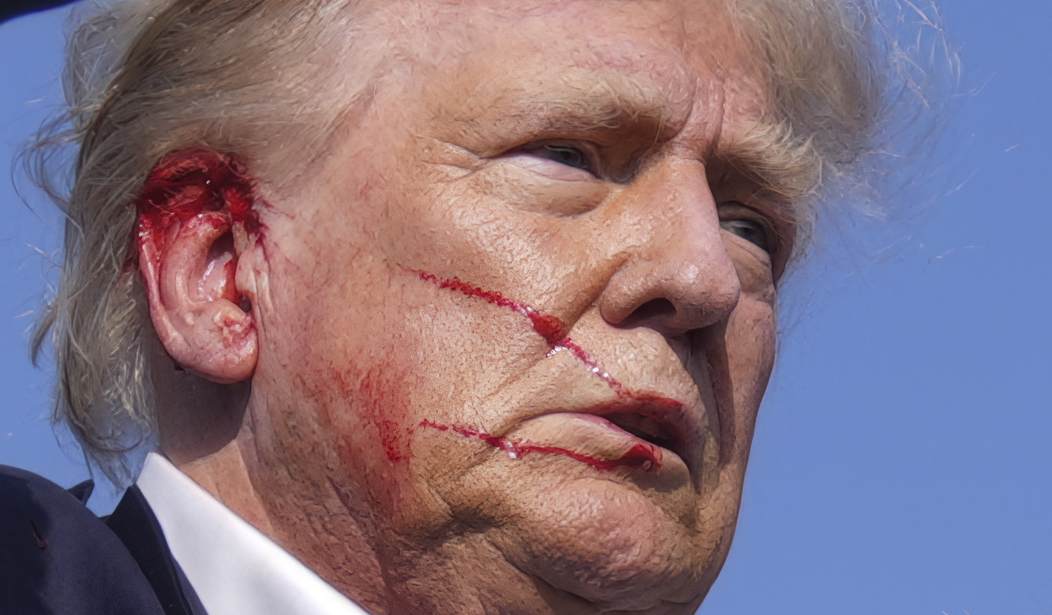How the Trump Assassination Attempt Changes the Presidential Campaign

With red rivulets of blood trickling down his face, the once-and-future president gazed skyward and paused – just briefly – before suddenly raising his fist with unbowed defiance as the American flag unfurled itself, stretching her bright stripes and white stars until it engulfed Trump’s horizon. And the American people exploded in wild applause.
That was it.
The moment Donald Trump’s rally was transformed into the closing scene of "Rocky IV" was the seminal moment of the 2024 presidential campaign. All that was missing was "Hearts on Fire" by John Cafferty and the Beaver Brown Band blazing in the background (honorable mention to Survivor’s "Burning Heart").
The true impact of the assassination attempt won’t be felt for weeks. When something profoundly shocking and emotionally uncomfortable happens, we psychologically deal with it piecemeal because it’s just too big and overwhelming to comprehend. So, we first try to analogize the attempt on Trump’s life by comparing and contrasting it to other events (JFK? The George W. Bush shoe incident? RFK? Reagan and Hinkley? Or maybe a foreign assassination, i.e., Shinzo Abe?), but these analogies fail to capture the sheer magnitude of what we all witnessed.
This was… different.
In part, it was different because Trump is different. His life’s journey has been so bizarre – so utterly unpredictable – that a suitable comparison eludes us. But the other part is the faux intimacy of today’s media culture: Even if you’ve never attended a single Trump rally, you’ve probably watched dozens of them – via TV, social media, and online clips. Trump is an expert at forging personal relationships with large swaths of people via media platforms, but more than anything else, it’s today’s culture that fueled this sense of one-on-one familiarity: Trump isn’t just someone we watch – he’s someone we personally know.
And last night, the American people saw someone they personally know get shot in the frickin’ head on live television.
It changes the trajectory for both candidates: Trump has now cheated death, taken the slings, arrows, lawsuits – and even bullets – of his fiercest critics, and he’s still standing. (If anyone ever wondered why the UFC crowd has such an affinity for the ex-president, this moment answered it.)
Before, Trump was just a man. Now? He’s still a man, of course, but it feels different somehow. Like there are celestial forces at work that aren’t beholden to the trivialities of partisan politics. It’s the elevation of leader to prophet and from prophet to saint. As Nietzsche wrote in 1888, “What doesn’t kill me makes me stronger.” And today, Trump exudes strength, power, leadership, determination and defiance.
For Biden, his political calculus has also been permanently altered: When you’re trailing, you’re incentivized to attack. In fact, depending on how much you trail, you need to attack – it’s your shortest path for making up lost ground. And in binary elections – when your choice is either A or B – mobilizing your base to vote against your opponent is just as effective as getting them to vote for you. The more you can demonize your opponent, the better your chances will be.
Post-assassination attempt, Biden really can’t attack Trump the way he did before. He can’t use phrases like “target” or “crosshairs.” He can’t use dehumanizing language. He can no longer suggest that the world would be a better place if Trump – and the MAGA movement – didn’t exist.
The sharpest colors draw the cleanest contrasts. But now, the language Biden can freely use in public discourse has been dulled. Before, Biden was demonizing the Devil. Now, he’ll be demonizing not just a man, but a man who deserves our sympathy, respect, and admiration. (And if it turns out that the Biden administration wasn’t totally forthright in allocating Secret Service protection to their opponents, all hell will break loose.)
Age, fate, incompetence, and rapidly advancing senility have stripped the Biden campaign of its most potent ammo, but the one quiver Biden still has left is his thin veneer of likability. Despite what one (excluded) grandkid might say, Biden has built his brand as a likable family man who’s simply a “nice guy.” Alas, he’ll have to sacrifice that image if and when he demonizes a man who just stared the Reaper in the eye. He might bloody Trump, but he’ll bloody himself even worse.
Still, the number one takeaway from the Trump assassination attempt hasn’t happened yet. It’ll take a few more weeks for all the emotional angst to stop churning, stop marinating, and finally hit rock bottom – and when it does, the voters’ perceptions will undergo a dramatically different shift.
There’s a machismo gap (or call it a toughness gap). On one side, you have an unbowed, unbroken, unrepentant Trump, hoisting his fist in the air and urging Americans to continue to fight the good fight. And on the other side, there’s Joe Biden… stumbling over stairs, falling off bikes, shuffling his feet, and looking like a stiff sneeze could send him to the ER. Whereas Donald Trump is channeling his inner Stallone and posing for a "Rocky IV" remake, Joe Biden looks older than the dust between Nebuchadnezzar’s toes. It’s a helluva contrast.
And it’s this contrast that will stay with the American people through November.
No comments:
Post a Comment